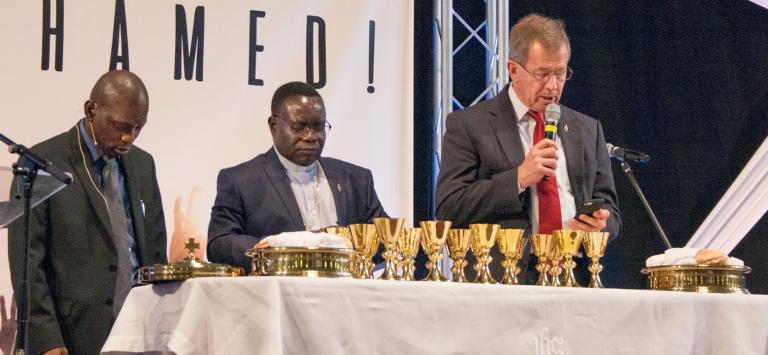
Last weekend was the first-ever global legislative assembly for the Wesleyan Covenant Association, the United Methodist traditionalist caucus group. It was for all practical purposes, the inauguration of a new denomination. At their assembly, they adopted a resolution saying they would be “forced to leave” the United Methodist Church if the One Church Plan which allows for regional LGBTQ inclusion is adopted at the February 2019 General Conference.
There has been talk from traditionalists for at least the past decade about the need for an “amicable separation” between traditionalist and progressive United Methodists. Is this rhetoric in good faith or is it a strategy for political leverage intended to corral the centrist vote at General Conference? How the WCA answers that question depends on whether they admit that they have formed a new denomination.
Right now, the United Methodist Church is locked into a dysfunctional family system, because of the ossified positions of at least five constituencies.
The traditionalists say they cannot be part of a denomination where gay marriage is allowed anywhere.
The centrists try to appease the traditionalists legislatively whenever traditionalists take a hard line of surrender to us or else we leave, and then try to appease the progressives by finding creative ways not to enforce the legislation they passed.
Progressive pastors keep on marrying gay people at the risk of their loss of ordination out of a sense of both pastoral and prophetic duty.
Most bishops are unwilling to defrock dozens of pastors in their conferences for doing gay weddings both for pastoral and logistical reasons.
Most General Conference delegates from outside the US want the United Methodist Church to both stay together and retain its anti-LGBTQ stance, so they will vote as a bloc against both amicable separation and any kind of regional LGBTQ inclusivity, which locks us into a permanent quagmire.
The most likely outcome of the February 2019 General Conference is a victory for the same traditionalist position which had 60% support at the last General Conference given the combined bloc of the US traditionalists and the African and Asian delegates. Which means that we will remain stuck in the same place we were.
Even if the traditionalists are able to tighten the noose on progressive pastors who do gay weddings and handcuff the bishops with mandatory penalties (which the conservative-dominated judicial council seemed to rule unconstitutional), progressive pastors will continue to do gay weddings and suffer whatever consequences result, and gay people who are called by God to ordained ministry will continue to pursue ordination.
That’s the problem with a religion whose founder said, “If you want to be my disciple, then take up your cross and follow me.” We say in our communion liturgy that the church was created “by the baptism of Christ’s suffering, death, and resurrection,” which were all a result of his clergy trial at the hands of the Sanhedrin.
If Jesus’ words are the measure of discipleship, that means that pastors are not faithful disciples of Jesus Christ if clergy trials scare them into abandoning their convictions. If we are in fact making disciples of Jesus Christ and some of those disciples are absolutely convinced that LGBTQ inclusion is the will of God, then it’s straightforward obedient discipleship for them to be crucified just like Jesus was.
Say they’re wrong if you want to, but the reason they do what they’re doing is because they’re trying to be faithful disciples of Jesus and live out their baptismal covenant “to resist evil, injustice, and oppression in every form that they present themselves.” So tightening up consequences isn’t going to change anything except to perpetuate our quagmire. Every clergy trial is only going to intensify the public pressure on traditionalists to change and agitate traditionalist laity to ditch United Methodism for the evangelical megachurches.
So then the question for traditionalists becomes: do you really want to leave or are you just going to keep on saying that you’re leaving in order to stay in control? If you really want to leave amicably, then why not do so by abstaining from the 2019 General Conference and negotiating an exit strategy as the new denomination you’ve just inaugurated instead of keeping United Methodism deadlocked in our endless cycle?
I’m not sure what the constitutional ramifications are, but should a United Methodist General Conference delegate be allowed to vote at our General Conference after he has already joined a new denomination by voting in its inaugural gathering? If United Methodist General Conference delegates voted in the Nazarene General Conference, wouldn’t they be disqualified from representing United Methodism? The question of dual denominational affiliation is a real issue that should be clarified by our judicial council.
If the United Methodist Church splits up, NOLA Wesley will probably lose our institutional funding as a campus ministry and have to make it up through private donors. That’s going to be very hard for us. But I think Paul’s teaching on divorce in 1 Corinthians 7 is applicable here: “if the unbelieving partner separates, let it be so; in such a case the brother or sister is not bound. It is to peace that God has called you” (v. 15).
Each of us thinks that the other one is the “unbelieving partner,” but progressives aren’t pushing to separate. Since traditionalists do not believe in sharing a denomination with LGBTQ clergy and weddings, they should be allowed to leave. If they insist on forcing their will on the denomination, then there will be many clergy trials and crosses which may help with the sanctification of the pastors on trial, but they will also accelerate our denomination’s collapse.
My hope is that the traditionalists will think in terms of mission rather than control. Perhaps one day the UMC will collaborate with the WCA the same way that I collaborate with campus ministers who are much more conservative than me when it helps the cause of the kingdom of God. I’m ready for those who want to leave to do what they’re going to do if they’re really saying so in good faith.
If you do support inclusive Christian campus ministry, please help NOLA Wesley prepare for our new denominational reality after February 2019 by becoming a monthly patron or offering a one-time gift.












